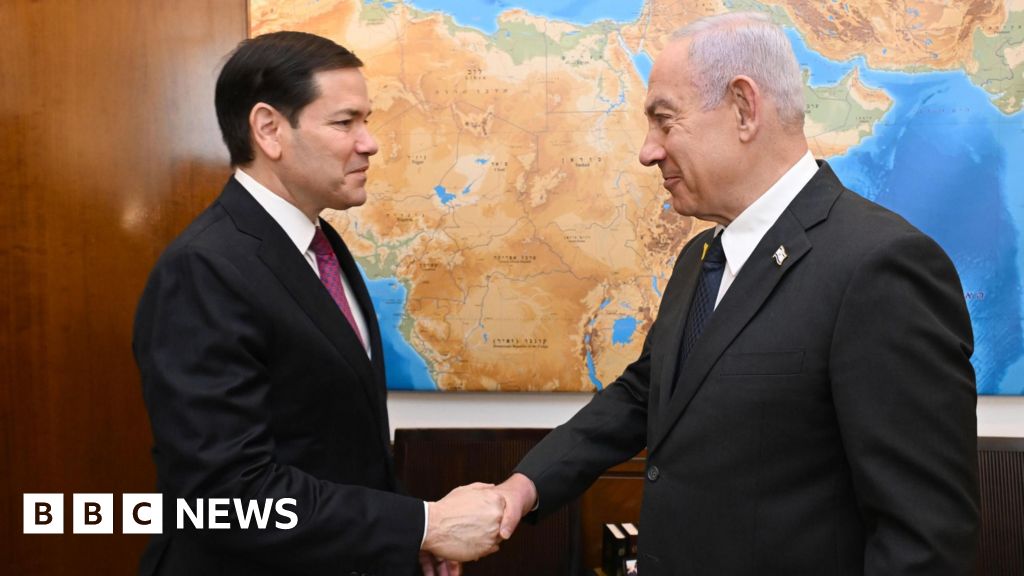Israeli Prime Minister Benjamin Netanyahu has not ruled out further strikes on Hamas leaders following last week’s attack in Qatar, saying they would not have immunity “wherever they are”.
Speaking at a joint press conference with US Secretary of State Marco Rubio in Jerusalem, Netanyahu said every country had the right “to defend itself beyond its borders”.
Israel’s decision to target senior Hamas leaders in Qatar – a close US ally – drew international outrage and criticism from US President Donald Trump. Hamas said six people were killed but that its leaders survived.
When pressed on whether the US had any involvement in the strike, Netanyahu told journalists: “We did it on our own. Period.”
The meeting between Rubio and Netanyahu comes as Arab leaders hold a summit in a show of support for Qatar. Its prime minister urged the international community to stop applying “double standards” and to punish Israel.
In response to a question from the BBC about whether Israel’s strike had damaged US relations in the region, Rubio said Washington maintained “strong relationships with our Gulf allies”.
Qatar hosts a major US airbase and has played a key role in brokering diplomatic efforts to end the war in Gaza, serving as a mediator of indirect negotiations between Hamas and Israel.
On Sunday, Netanyahu told reporters that the US-Israel relationship was as “durable as the stones in the Western Wall” while he and Rubio made a short visit to the holy site in Jerusalem’s Old City.
During the trip – on which they were accompanied by US ambassador to Israel Mike Huckabee – Rubio wrote a note and placed it into the wall, a traditional ritual performed by visitors. The men ignored reporters’ questions focusing on Israel’s strikes in Qatar.
Also thought to have been discussed by Netanyahu and Rubio are Israeli military plans to seize Gaza City and Israel’s continued expansion of settlements in the occupied West Bank.
Over the weekend, the Israeli military pressed ahead with the demolition of residential buildings in Gaza City, and – according to local media – is now poised to begin ground operations in the Western neighbourhoods of the city.
It has demanded that Gaza City’s residents leave and head south to a central area of the strip. The Israel Defense Forces (IDF) estimate about 250,000 Palestinians have fled, though hundreds of thousands are believed to remain in the area.
Some say they cannot afford to go south, while others say southern Gaza is not safe as Israel has carried out air strikes there too. Some have said they attempted to go south but were unable to pitch their tents, so returned to Gaza City.
Netanyahu and Rubio’s meeting comes ahead of a UN General Assembly session next week, at which some leading US allies – including the UK, France, Canada, Australia and Belgium – are expected to recognise the State of Palestine.
This expected recognition has intensified debate within Israel around the future of the West Bank, with more hardline elements of the government insisting annexation is the only way to prevent a Palestinian state.
In late August, the Israeli government gave final approval for the E1 settlement project east of Jerusalem, which would, in effect, split the West Bank in two – dividing the Palestinian populations in the north and south.
Signing an agreement to press ahead with E1 last Thursday, Netanyahu said: “We are going to fulfil our promise that there will be no Palestinian state. This place belongs to us.”
Earlier this month, Israel’s far-right Finance Minister Bezalel Smotrich unveiled his proposal for the annexation of approximately four-fifths of the West Bank.
Israel has built about 160 settlements housing 700,000 Jews since it occupied the West Bank and East Jerusalem – land Palestinians want, along with Gaza, for a hoped-for future state – during the 1967 Middle East war. An estimated 3.3 million Palestinians live alongside them.
The settlements are illegal under international law.
On Monday evening, Rubio is set to visit the City of David archaeological park, which was established by a settler organisation in the Palestinian neighbourhood of Silwan, in occupied East Jerusalem.
He will attend the inauguration of the “Pilgrimage Road”, a tunnel excavated underneath Palestinian homes that is said to mark the route of a Roman-era street taken by pilgrims to the Biblical temple that once stood on the site known to Jews as the Temple Mount and to Muslims as al-Haram al-Sharif (Noble Sanctuary).
Critics say the City of David park is an attempt to politicise archaeology, at the expense of Palestinian residents.


Comment ×